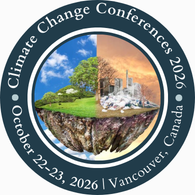Sessions of Climate Change and Earth Science
Track 1: Climate Change and Climatology
Climatology, branch of the atmospherically sciences involved each the outline of climate and also the analysis of the causes of climatically variations and changes and their sensible consequences. Meteorology includes the systematic and regional studies of atmospherically conditions i.e., weather and climate. Climate indices area unit large-scale weather patterns that area unit consistent and measurable. The goal of associate index is to combine sort of things into an outsized, generalized description of either air or ocean phenomena which can be accustomed track the worldwide climate system. According to the United Nations’ Intergovernmental Panel on global climate change (IPCC), this scientific consensus of variations in solar activity plays a small role in climate change. Warming from increased levels of human-produced greenhouse gases is really repeatedly stronger than any effects thanks to recent variations in solar activity.
Track 2: Pollution & Its Effects on Climate
Pollution is that the presence of a waste within the atmosphere and is typically the results of human actions. Pollution includes a prejudices impact on the atmosphere. Animals, fish and alternative aquatic life, plants and humans all suffer if the pollution is not controlled. One in every of the simplest issues that the earth is facing nowadays is that of environmental pollution, increasing with each passing year and inflicting grave and irreparable harm to the planet. In some cases, air pollutants, and greenhouse gases contribute to Global climate change. Marine pollution happens once probably harmful, effects result from the entry into the ocean of all types of waste like chemicals, particles, industrial, agricultural, and residential waste, noise, or the unfold of invasive organisms. The discharge of greenhouse gases causes the ocean to become hotter and causes the marine climate to become unfriendly leading to harm the marine system and marine life.
Track 3: Environmental Toxicology
Environmental toxicology is an interdisciplinary field of science bothered with the study of the harmful effects of varied chemical, biological and physical agents on living organisms. Eco toxicology may be a sub discipline of environmental toxicology bothered with studying the harmful effects of toxicants at the population and ecosystem levels. Organisms are often exposed to distinct sorts of toxicants at any life cycle stage, a number of which are more sensitive than others. Toxicity can also vary with the food web of organism's placement. Bioaccumulation occurs when an organism cache toxicant in fatty tissues, which can eventually establish a trophic cascade and therefore the bio magnification of specific toxicants. The results of a chemical or other substance at various applications on various species.
Track 4: Endangered Species and Forestry
The jury remains out on whether a tree falling within the backwoods makes a sound, however it positively has an impact. That is particularly valid for imperiled and endemic species, which just make them remain region of suitable lebensraum left on Earth, almost like Madame Berthe's mouse lemur in Madagascar, the sky-blue toxic substance dash frog in Peru and Canada's challenging crane. New examination discovers the disturbing proof misfortune inside Alliance for Zero Extinction destinations of tree cover. From 2001 to 2013, AZE locales lost 3 million sections of land (1.2 million hectares) of tree cover. While this is often a moderately little measure of tree cover misfortune contrasted with worldwide midpoints, for species in AZE destinations, losing even a touch zone of tree cover can mean last chance.
Track 5: Risks of Climate Change
Global climate change has already had observable effects on the environment. Glaciers have shrunk, ice on rivers and lakes is ending earlier, plant and animal ranges have shifted, and trees are flowering sooner.
Effects that scientists had predicted within the past would result from global climate change are now occurring loss of sea ice, accelerated water level rise and longer, more intense heat waves. In each of our nine cases, the extent of physical climate risk increases by 2030 and further by 2050. Across our cases, we discover increases in socioeconomic impact of between roughly two and 20 times by 2050 versus today’s levels. We also find physical climate risks are increasing across our global country analysis whilst some countries find some benefits.
Track 6: Earth Science and Climate Change Policies
Earth science or geoscience includes all fields of science related to the planet Earth. This is often a branch of science managing the physical constitution of the planet and its atmosphere. Earth science is that the study of our planet’s physical characteristics, from earthquakes to raindrops, and floods to fossils. The numerous purposes of the world sciences are to acknowledge the present capabilities and therefore the past evolution of the world and to use this information, whereby acceptable, for the advantage of human race. Some earth scientists use their information of the planet to seek out and develop energy and natural resources. Others study the impact of act on Earth's environment, and elegance ways to guard the planet.
Track 7: Climate Hazards
Climatic hazards are agents of disaster in terms of what they'll do to human settlements or to the environment. Potentially hazardous atmospheric phenomena include tropical cyclones, thunderstorms, tornadoes, drought, rain, hail, snow, lightning, fog, wind, temperature extremes, pollution, and climatic change. Identification of hazardous events isn't easy, although certain criteria are usually present. They include property damage; economic loss, like loss of income or a halt in production; major disruption of social services, including communications failures; excessive strain on essential services such as police, fire, hospital, and public.
Track 8: Global Warming.
Most scientists agree that the world is actually experiencing increasing temperatures, and lots of believe that humans are enhancing this overall warming trend. The likely effects of worldwide warming won't be limited to at least one country or maybe one continent and can permeate almost every aspect of the environment and of life for all living things. Potential effects listed here are just a couple of these discussed within the Intergovernmental Panel on Climate Change’s (IPCC) 2007 report. Raising sea levels are the foremost common concern, taking place with a thermal expansion of the oceans a result of water molecules expanding in warmer temperatures, increased precipitation, and the melting of mountain glaciers. Because all bodies of water have varying shapes and ocean water tends to “swell” differently counting on its starting temperature. In the 20th century alone, sea levels rose 0.17 meters predictions for subsequent century range anywhere from 0.18 to 0.59 meters.
Track 9: Earth Science.
Earth sciences, the fields of study concerned with the solid Earth, its waters, and therefore the air that envelops it. Included are the geologic, hydrologic, and atmospheric sciences. The broad aim of the world sciences is to know these features and therefore the past evolution of Earth and to use this data, where appropriate, for the advantage of humankind. Thus, the essential concerns of the world scientist are to watch, describe, and classify all the features of the world, whether characteristic or not, to get hypotheses with which to explain their presence and their development, and to plan means of checking opposing ideas for his or her relative validity. In this way the foremost plausible, acceptable, and long-lasting ideas are developed.
Track 10: Climate Change & Biodiversity
Climate change plays a crucial role in the change of biodiversity of the planet. There is an ample evidence that climate change affects biodiversity. According to the Millennium Ecosystem Assessment, global climate change is probably going to become one among the foremost significant drivers of biodiversity loss by the top of the century. Climate change is already forcing biodiversity to adapt either through shifting habitat, changing life cycles, or the event of latest physical traits. In the air, gases, for example, water vapor, carbon dioxide, ozone, and methane act like the glass top of a nursery by catching warmth and warming the planet.
Track 11: Health Consequences & Adaptability Development
There is near unanimous scientific consensus that greenhouse emissions generated by act will change Earth's climate. The recent (globally averaged) warming by 0·5°C is partly due to such anthropogenic emissions. Climate change will affect human health in many ways—mostly adversely. Here, we summarize the epidemiological evidence of how climate variations and trends affect various health outcomes. We assess the small evidence there's that recent heating has already affected some health outcomes.
Track 12: Regenerative Agriculture to Reverse Climate Change
A world during which neediness and imbalance are endemic will dependably be inclined to natural and different emergencies. Feasible improvement requires meeting the elemental needs of all and stretching bent all the prospect to satisfy their desires for a superior life. While organic agriculture focuses on sustainability, regenerative agriculture takes things further. By working with nature, regenerative agriculture can reverse global climate change by revitalizing ecosystems, increasing biodiversity and restoring soils degraded by industrial farming.
Track 13: Climate Change Challenges & Sustainability
Renewable energy sources replenish themselves naturally without being depleted in the earth; they include bioenergy, hydropower, geothermal energy, solar energy, wind energy and ocean (tide and wave) energy. Sustainable development has become the center of recent national policies, strategies, and development plans of many countries. The return-to-renewables will help mitigate climate change is an excellent way but needs to be sustainable in order to ensure a sustainable future and bequeath future generations to meet their energy needs.
Track 14: Greenhouse Gases
A greenhouse emission (sometimes abbreviated GHG) may be a gas that absorbs and emits energy within the thermal infrared range. Greenhouse gases cause the greenhouse effect on planets. The primary greenhouse gases in Earth's atmosphere are water vapors (H2O), CO2 (CO2), methane (CH4), laughing gas (N2O), and ozone (O₃). Without greenhouse gases, the typical temperature of surface would be about −18 °C (0 °F), instead of this average of 15 °C (59 °F). The atmospheres of Venus, Mars and Titan also contain greenhouse gases.
Track 15: Climate Change: Marine Life
Marine Species suffering from global climate change include plankton - which forms the idea of marine food chains - corals, fish, polar bears, walruses, seals, sea lions, penguins, and seabirds. The Intergovernmental Panel on global climate change predicts an extra rise of between 1.4°C and 5.8°C by the top of the century. Climate change could therefore rather be the knock-out punch for several species which are already under stress from overfishing and habitat loss. A study has shown that fish within the North Sea have moved further north or into deeper water in response to rising sea temperatures. Other species may lose their homes for other reasons. The distribution of penguin species within the Antarctic Peninsula region, for instance, is changing with reductions in sea ice thanks to heating.
Track 16: Waste Management.
The impact of climate change on waste management infrastructure is likely to become increasingly important and there are some threats which should not be ignored. Landfills have a significant long-lived pollution potential due to slow degradation of biodegradable content and insufficient flushing of leachate through the contained material. Current infrastructure may be vulnerable to flooding, with the incidence of more extreme weather events. The impacts need to be understood and measures put in place to ensure that resilience to such events is adequate.
There are also potential waste and public health impacts in the aftermath of extreme catastrophic events. The waste management sector was responsible for around 4 percent of UK greenhouse gas emissions in 2013, with methane being by far the most prominent gas (91 percent). The vast majority of these emissions are from landfill sites.
Track 17: Air pollution
Air Pollution continues to stay a public health concern despite various actions taken to regulate pollution. The problem becomes more complex thanks to multiplicity and complexity of air polluting source mix (e.g., industries, automobiles, generator sets, domestic fuel burning, roadside dusts, construction activities, etc.). The urgent needs during this theme are extensive data compilation, management and interpretation of the monitored air quality, development of grid-based emission inventory of the required pollutants (PM10, PM2.5, SO2, NOx, CO, benzene, metals and PAHs), meteorological and air quality modeling of these pollutants with prediction capabilities.
Track 18: Solar and Volcanic Activity.
Physical Climate models are unable to reproduce the rapid warming observed in recent decades when considering only variations in solar output and volcanic activity. As the Sun is that the Earth's primary energy source, changes in incoming sunlight directly affect the climate system. If solar variations were liable for the observed warming, warming of both the troposphere and therefore the stratosphere would be expected, but that has not been the case.
Explosive volcanic eruptions represent the most important natural forcing over the economic era. When the eruption is sufficiently strong (with Sulphur dioxide reaching the stratosphere) sunlight are often partially blocked for a few of years, with a temperature signal lasting about twice as long. In the industrial era, volcanic activity has had negligible impacts on global temperature trends.
Track 19: Climate Change Adaptation.
Adaptation is "the process of adjustment to current or expected changes in climate and its effects". As global climate change effects vary across regions, so do adaptation strategies. While some adaptation responses involve trade-offs, others bring synergies and co-benefits. Increased use of air con allows people to raised deal with heat, but also increases energy demand. Other samples of adaptation include improved coastline protection, better disaster management, and therefore the development of more resistant crops.
Adaptation is especially important in developing countries since they are predicted to bear the brunt of the effects of climate change. The capacity and potential for humans to adapt, called adaptive capacity, is unevenly distributed across different regions and populations, and developing countries generally have less. There are limits to adaptation and more severe global climate change requires more transformative adaptation, which may be prohibitively expensive.







